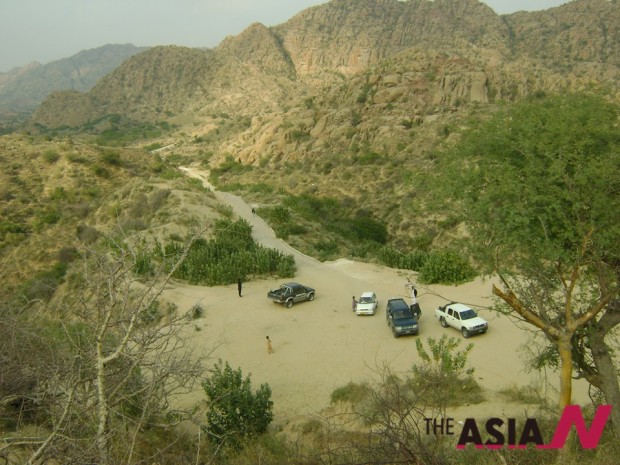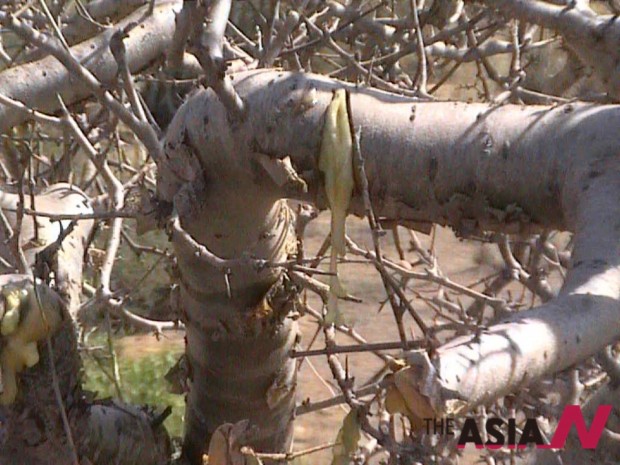[Exclusive Report] Environmental Disaster in world’s 4th biggest Thar Desert: Thousands of Gugral trees dry up due to illegal extraction of resin
Like in the past, hundreds of kilograms of gum, illegally extracted from Camphora Mukal, the gum-producing trees, locally known as Gugral, by using poisonous chemical, were being transported in vehicles to Karachi this year too, as the conservators of forests and wildlife in Nagarparkar area of Tharparkar district of Sindh province of Pakistan, bordering India, one of the Ramsar sites, remained in traditional deep slumber. This illegal activity has resulted in death of thousands of such trees in vast area of Nagarparkar and Deeplo regions of district.
None of the agencies including the Forest and Wildlife Departments of Sindh, Police and the Rangers stop the vehicles and seize the illegally extracted gum (resin) at the check-posts established in Thar Desert or at any other district throughout their 500km journey from Nagarparkar to Karachi, as the persons involved in this trade are influential and they get the gum extracted through the hired local people.
It’s surprising that even the Pakistan Rangers, having its check-posts in 100km area from Islamkot town to Nagarparkar, turning it into a cantonment where nobody could enter or leave without its permission do not check vehicles carrying the gum to curb the illegal trade. The Rangers’ presence in this area is mainly due to Indian border besides huge coal reserves found in Thar Desert near Islamkot.
The illegal trade of extracting resin from Gugral trees started back in 1990s and since then continues in connivance of officials of concerned departments, as the local social workers and environmentalists allege. “The district administration imposes ban on chopping of trees and illegal extraction of gum but the ban is effective only for seven days, a very brief period, which expires by the time notification reaches the concerned officials for enforcement,” Bharumal, a writer and social worker told The AsiaN/Magazine N on phone from Mithi, the district headquarters town.
The Nagarparkar area, blessed with Karonjhar Mountain, spread over 16 miles, had over one hundred thousands of lush and green Gugral trees in 1990s, which added to the beauty of the area besides providing a big source of fodder to the goats and other livestock, but now seventy percent of the trees have dried up due to unnatural and artificial extraction of resin from the trees,” Salim Khoso, a local journalist of Nagarparkar told on phone.
The Gugral tree, loved for its aroma during the rainy season, dries within six months after the resin is extracted by using poisonous chemical through cuts made with axes,” he told adding that since the tree bears resin in winter, this season suits the illegal traders, who start their activities in December every year continuing till April. The Gugral trees are found only in Nagarparkar and coastal area of Deeplo. The trees could be found scattered in other desert area but there are clusters of Gugral trees at Karonjhar Mountain and surrounding areas. The Karonjhar Mountain is located at far end of Thar Desert adjoining to Indian Territory of another desert Runn of Katch. The resin released by the trees in natural way is generally of dark colour but it becomes yellowish when extracted artificially using the chemicals.
“The resin traditionally used in Jain and Hindu temples for its aromatic peculiarity, is also used in medicines, cement and manufacturing the video cassettes as well,” he said.
The gum is sold in Karachi at the rate of Pakistani rupees 40000 (US$400) per 40kg, which has made it a lucrative business for the local influential people.
Tanveer Arif, the CEO of Society for Conservation & Protection of Environment SCOPE, expressing concern on illegal trade of extracting the gum and said his organization had been raising voice against it at different forums but all in vain. “These illegal activities are harming the biodiversity in the area, which has been protected by the laws of the country. If the Gugral trees continued drying up with this pace, it would speed up desertification and ultimately would cause natural calamity,” he said adding that his organization has launched a Gugral Plantation Project in Nagarparkar area.
Few years back, the SCOPE had launched awareness drive among the local people informing them about the importance of Gugral tree, which remains green and provides fodder to the livestock even during droughts.
The NGO had organized a Rakhi Bandhan festival during which hundreds of local women tied Rakhis (strip of cloth) to the Gugral trees declaring them ‘brothers’. The Rakhi Bandhan is an annual Hindu custom of tying Rakhi to the men by their sisters. Different NGOs had also formed an alliance to launch the joint struggle against the Mafia but later they all parted ways.
“The SCOPE has now launched a project of Gugral Tree Farming in Nagarparkar area with Scottish-funding. So far we have planted around 50, 000 trees at the lands owned by local people, around their houses and at some other places. We are encouraging the locals to adopt it as a source of livelihood and for that the SCOPE is paying a nominal amount to the planters since last six months to look-after the trees. The project will continue paying them till March 2016 and the villagers are bound to protect the tree and do not extract the resin artificially for three years,” Shahnawaz Hingorjo, Assistant Project Coordinator, SCOPE, told on phone from Mithi.
The SCOPE has devised a monitoring system and undertakes counting of trees every month to ensure the existence of planted trees, he said adding that the branches of Gugral tree are planted and watered regularly to make it grow.
He told that a Vigilance Committee consisting of a local judge, officials of Rangers, police, Forest, Wildlife Departments, representatives of NGOs and Media, exists and issues warnings against the extraction of resin from Gugral trees and chopping of other trees facing the extinction, but with no particular results. “The illegal trade of artificially extracted resin amounts to Pakistan rupees ten million (US$100000) in a year,” he said.
The Tharparkar is one of the five famous eco-ranges of Pakistan but surprisingly Sindh Environment Protection Agency too remains indifferent to saving this area.
The IUCN, an international organization working on the environment, has enlisted the Gugral shrub, about 4 to 6ft height, in Red Data List. The Gugral tree in 2sq km area yields 4000 to 4800kg resin weekly. Since the tree releases resin normally in small quantities, the chemicals are used to extract it in bigger quantities.
Thar Desert had been facing famines through the centuries due to less or no rains. The destruction of Gugral trees, which remains green in during drought, has affected the biodiversity in the region, where the massive scale deaths of humans as well as animals has become a routine. As many as 500 deaths of people, especially the children, occur every year in Thar Desert. Around 350 children have died since October 2014 while the toll since January 2014 till date is said to be 700. The government denies that starvation is the cause of death but the doctors say it is mainly due to malnutrition.















































